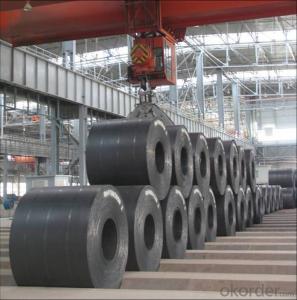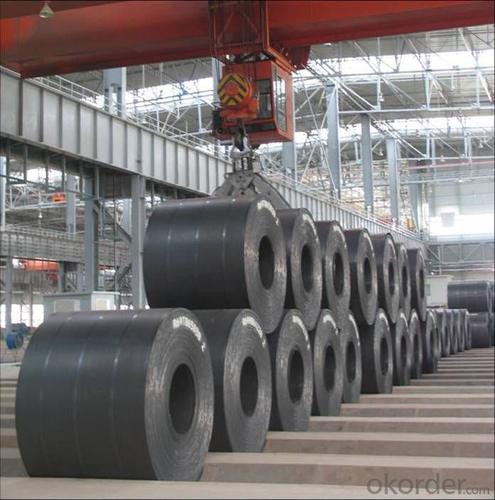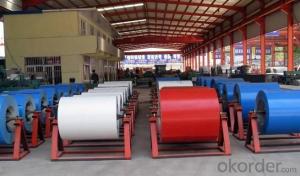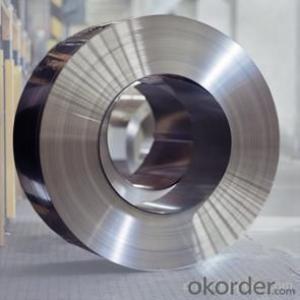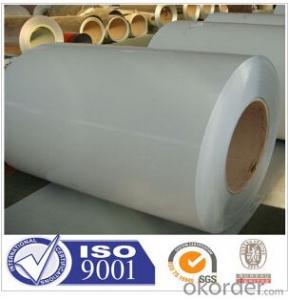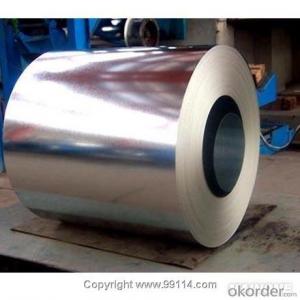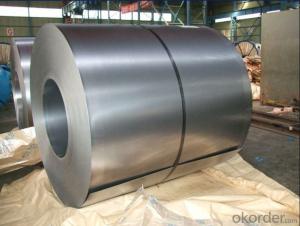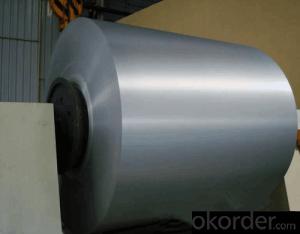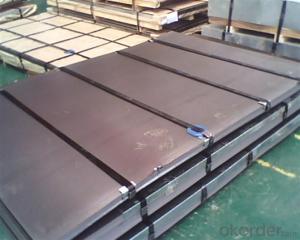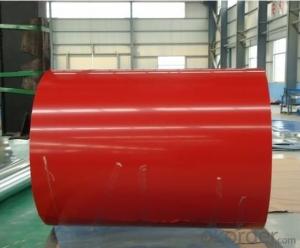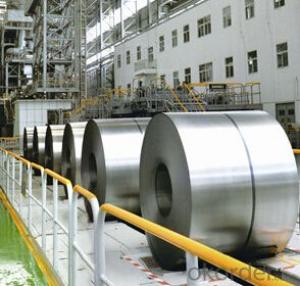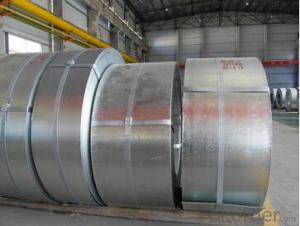AISI, ASTM, BS, DIN, GB, JIS Cold Rolled Steel Coil
- Loading Port:
- Tianjin
- Payment Terms:
- TT OR LC
- Min Order Qty:
- 20 m.t.
- Supply Capability:
- 15000 m.t./month
OKorder Service Pledge
OKorder Financial Service
You Might Also Like
Quick Details
Standard: AISI, ASTM, BS, DIN, GB, JIS
Steel Grade: ASTM653A; DX51D+Z JISG 3302 CGCC
Thickness: from 0.15mm to 3.0mm
Place of Origin: Tianjin, China (Mainland)
Technique: Cold Rolled
Surface Treatment: cold rolled
Application: Construction
Model Number: Steel Coil
Width: from 914mm to 1250mm
Length: Coil or cliens requirements
Delivery time: about 30-60 working days
Packaging Detail: Fully seaworthy export packing with paper tube
Coil weight: 3-10 ton or client's suggestion
Packaging & Delivery
Packaging Details:
Fully seaworthy export packing with paper tube
Delivery Detail:
about 30-40 working days if the quantity below 500 ton
- Q: What is the difference between regular steel stainless steel? Why does steel rust but stainless wont? Is stainless some kind of alloy or something? Any knowledgeable input would be great. Thanx!
- the reagent of choice is toluene-3,4-dithiol.
- Q: I have a carbon steel file that I want to bend in a letter C shape. So, what is the malliable temperature? If it's low, could it be done in a camp fire?
- It needs to be RED hot, the hotter the better. Yes you can use a camp fire if you put the file directly in the hottest part of the coals, but it'll take about 5-10 minutes to heat. Charcoal briquettes would probably work better as a heat source. You can use something like a blow dryer to intensify the coals, that might help. You'll also need a bench vice, and the biggest pair of pliers you can find, for leverage. Bending steel's not easy even when it's hot. You could also use a bit of steel pipe that'll fit over the end of the file. Stick the file in the vise when red-hot, slip the pipe over the free end, and use the pipe to bend it. OR, you could use the old-fashioned method of just holding it with pliers in one hand, and hitting it with a 5lb sledge hammer with the other. use something solid as an anvil, like a large steel pipe. you mighe be able to get away with using a small log, but you'll have to work twice as hard. Safety glasses are MANDITORY for this type of thing. Do not attempt without eye protection at all times. Ear plugs are also a very good idea.
- Q: Don't ask me why, but I took my stainless steel ring and I heated it up with my gas stove. I stuck it in there til the metal turned red, and the flame which is normally blue turned orange for some reason when the metal turned red. Anyway, afterwards i cooled it off in water and now it's all discolored and it feels different. It's weighs less and it doesn't feel the same. Plus, it's ugly cause it's all black and blue. What happened? Someone help
- You oxidized it. There is nothing you can do to recuperate the oxidized metal. The best you can do is to polish off the rust with a commercial metal polish paste.
- Q: Explain how you could make plastic sink and steel float?
- Plastics that are more dense than water will sink. For floating, you need to displace more water than you weight, so assuming steel is 10 times denser than water you will need to displace 10 times as much water weight as your steel occupies. This is easy for a wide hull ship (barge)
- Q: Are you people aware of commercial steel warehouses, If yes then can you please explain their advantages and benefits?
- Compared to what?
- Q: Are steel coils recyclable?
- Yes, steel coils are recyclable. Steel is one of the most commonly recycled materials in the world. Coils made of steel can be easily melted down and used to produce new steel products, making them a valuable resource for recycling.
- Q: What are the different types of steel coil surface protection methods?
- There are several types of steel coil surface protection methods, including oiling, painting, galvanizing, and applying protective films. These methods help prevent corrosion, rusting, and damage to the steel surface during storage, transportation, and processing.
- Q: What are the different methods of forming steel coils into sheets?
- There are several methods of forming steel coils into sheets, including hot rolling, cold rolling, and annealing. Hot rolling involves heating the steel coils and passing them through a series of rollers to reduce their thickness and shape them into sheets. Cold rolling, on the other hand, does not involve heating the coils and instead uses pressure to shape them into sheets, resulting in a smoother and more precise finish. Annealing is a process that involves heating the steel coils to a specific temperature and then slowly cooling them, which helps to relieve stress and improve the material's ductility before it is formed into sheets.
- Q: hi i was doing a little history project on guns. i was just wondering if anyone could help me find out what material was used before steel and why this material wasnt as good as steel ( its faults)thanks for your help
- The most common was bronze, which was the strongest material that could be cast, at least until the industrial revolution. Until that time, furnaces which could reach temperatures hot enough to melt steel did not exist. The only way to work with steel would have been forging, which means hammering it into shape while red-rot. Obviously, this is not a very practical method for making large thick-walled cannons (though it was done on occasion. Small arms such as pistols and muskets could be easily made of steel by hand forging.) The most practical way to make cannons was pouring molten bronze which melts at significantly lower temperature than steel. Cast iron was also used. Note that Cast Iron contains 3%-7% carbon, compared to steel which only contains between 2% to 0.2% carbon. Due to the excessive carbon content of cast iron, it's melting point is about 500 degrees lower than steel enabling it to be melted with pre-industrial furnaces. Unfortunately, cast iron is also brittle, unlike steel or bronze. This means that a defective or cracked casting could easily explode, sending iron shrapnel everywhere. (Also, maiming and killing the gun crew, an experienced gun crew was as valuable as the cannon itself!) For this reason. Cast iron cannon were usually considered a cheap, risky alternative to expensive but durable bronze.
- Q: I know that it is used for katanas and swords but what is it and is it good i am pretty sure that it is the process of the steel but can I have a little more information.
- Damascus or Wootz was a type of steel that appeared around 300BC It originated in India before spreading throughout Asia and the Middle East. It was considered a good steel, and for it's date of origin, exceptionally advanced for the level of technology in the ancient world. However the techniques to create the steel were lost forever after a decline in the swords manufacturing. The most popular theory is that the metal containing the required trace elements became less available over time due to unreliable trade routes. In the modern area, many scientists and metallurgists have studied the surviving blades, resulting in many discoveries such as evidence of carbon molecules fused in a crystalline structure. While the blades do provide some clues, it's only a small part of a much bigger picture as to the full process of the metal from raw to finished product. Now many have claimed to have recreated Damascus/Wootz steel, but none are recognised as being authentic. It has become a market ploy these days that draws people to purchasing the blades but all you are actually seeing is one of the many various forms of folded or patterned steel, which has varying degrees of quality, strength etc. We do know the steel was folded similar to the way the Japanese did in creation of old Katana, so often people will sell Damascus steel Katana that are nothing but folded steel swords like others. (Which is beautiful and traditional, but was a process designed to uniform impurities in the metal, something we no longer need to do with modern metals)
Send your message to us
AISI, ASTM, BS, DIN, GB, JIS Cold Rolled Steel Coil
- Loading Port:
- Tianjin
- Payment Terms:
- TT OR LC
- Min Order Qty:
- 20 m.t.
- Supply Capability:
- 15000 m.t./month
OKorder Service Pledge
OKorder Financial Service
Similar products
Hot products
Hot Searches
Related keywords
